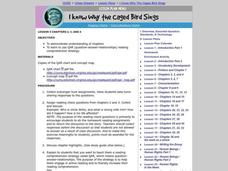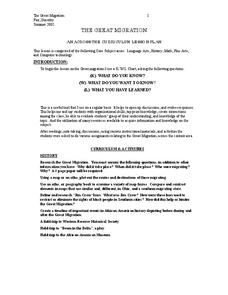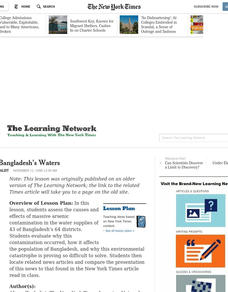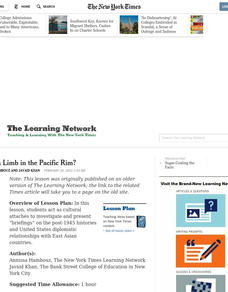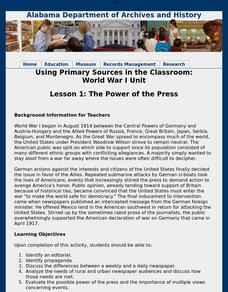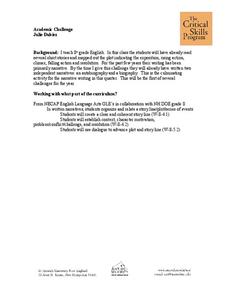iCivics
Drafting Board: Military Intervention
Should countries use their militaries to stop humanitarian crises in other countries? Learners make claims, organize their reasoning, and provide evidence for their arguments with this rich resource.
iCivics
Drafting Board: Electoral College
Should the president of the United States be voted by the Electoral College or the popular vote? Your young historians will consider the pros and cons of the Electoral College, and make an argument using reasons and evidence provided in...
iCivics
Drafting Board: Community Service
Should schools impose community service graduation requirements? In the final lesson of the Drafting Board series, learners solidify their practice of crafting an argument supported by sound reason and evidence.
Curated OER
I Know Why the Caged Bird Sings
Young scholars complete QAR activities for Maya Angelou's I Know Why the Caged Bird Sings. In this literary analysis lesson, students read chapters 2 and 3 and complete reading check questions. Young scholars discuss chapter highlights...
Curated OER
The Great Migration
Students research the Great Migration and answer questions to discover where it took place, when it took place, who were migrating, and why in a 2 page paper. They use a map or atlas to plot out the routes and destinations of those...
Curated OER
Tables, Charts and Graphs
Students examine a science journal to develop an understanding of graphs in science. In this data analysis lesson, students read an article from the Natural Inquirer and discuss the meaning of the included graph. Students create a...
Curated OER
Email Around the World
Students send and receive e-mail messages and find the location of each of the messages on a map. Students then write a description and trivia facts about their school to send to others.
San José State University
Parallelism
What is parallelism? Novice writers learn about parallelism and practice balancing 10 sentences for better syntax and parallel structure. A clear, straightforward worksheet with answers included.
National Earth Science Teachers Association
The Earth Scientist Project
Pairs of learners choose an earth scientist from an extensive list. They collect information by researching online or in books about the childhood, education, and major contributions made by their chosen scientist. When they present...
Curated OER
A Research Project and Article For the Natural Inquirer
Get your class to use the scientific process to solve a scientific problem. They utilize the Natural Inquirer magazine to identify a research question which they write an introduction to and collect data to answer. They use graphs,...
Curated OER
Unmasking the Middle East
Students explore many of the countries in the Middle East, developing research-based posters and a spider web illustrating the relationships among the countries. They write letters to fictional peers in Middle Eastern countries.
Curated OER
Planet of the Apes
The "Planet of the Apes" is becoming a staple in many high school classrooms and provides a way to explore a variety of topics.
Curated OER
Testing Bangladesh's Waters
Students assess the causes and effects of massive arsenic contamination in the water supplies of 43 of Bangladesh's 64 districts. They evaluate why this contamination occurred, and how it affects the population of Bangladesh.
Curated OER
The Dawn of Humanity
Students investigate recent archaeological challenges to theories of human origins. They research the history and geography of various African regions to create proposals for future excavations.
Curated OER
Presidential Places
Students investigate American presidential landmarks throughout the continental United States. They research and analyze American presidential landmarks to determine their value to American history and how they have been preserved over...
Curated OER
Out On A Limb In The Pacific Rim?
Young scholars act as cultural attachés to investigate and present briefings on the post-1945 histories and United States diplomatic relationships with East Asian countries. They articulate their foreign policy findings.
Curated OER
Chilling Predictions
Students research and prepare an almanac on the Arctic. They examine the laws that attempt to provide jurisdiction over this area and consider how these laws be affected if geography of the Arctic continues to change due to global warming.
Curated OER
The Power of the Press
Students identify an editorial and propaganda, discuss differences between weekly and daily newspapers, analyze needs of rural and urban newspaper audiences, and evaluate possible power of the press and importance of multiple views...
Curated OER
Story Writing
Students work in groups to create a story that will be presented to the class. In this story writing instructional activity, students complete a project planning sheet, work together to create a story that includes a hero and at least...
Curated OER
Storytelling
Learners compose a story and tell it to the class. In this storytelling lesson, students work in small groups to create an illustrated story. Learners are given a checklist of elements to include in the assignment. Students then create...
Curated OER
What's Fit to Print?
Students evaluate how newspapers are constructed and evaluate the extent to which newspapers serve their readers' interests.





